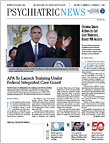Chronic, high-dose use of benzodiazepines among patients with schizophrenia appears to be associated with a markedly higher overall mortality rate than is seen in patients with schizophrenia who have not been exposed to benzodiazepines, according to a report in AJP in Advance (December 7, 2015).
The report also found a lower overall mortality rate among patients with schizophrenia who received antipsychotics and/or antidepressants.
“The results indicate that any amount of antipsychotic and antidepressant usage is associated with overall mortality rates 15 percent to 40 percent lower compared with no use of these medications,” wrote study authors Jari Tiihonen, M.D., Ph.D., and colleagues at the Karolinska Institutet in Stockholm. “In contrast, benzodiazepine exposure revealed a clear dose-response curve for mortality, where high exposure was associated with a 70 percent higher risk of death compared with no use.”
The authors prospectively compared all-cause and cause-specific mortality in individuals aged 16 to 65 who had been diagnosed with schizophrenia (N=21,492) in Sweden. All-cause and cause-specific mortality rates were calculated as a function of cumulative low, moderate, and high exposure to antipsychotics, antidepressants, and benzodiazepines from 2006 through 2010. The cohort participants were identified from two nationwide Swedish health care registers.
Compared with 214,670 age- and gender-matched persons from the general population, the mortality of the cohort with schizophrenia was 4.8-fold higher. The most common specific cause of death was cardiovascular disease (32.7 percent), followed by neoplasms (16.5 percent), respiratory diseases (11.0 percent), and suicide (9.5 percent).
Any degree of exposure to antipsychotics or antidepressants was associated with a lower overall mortality compared with no use. The opposite was observed for benzodiazepines, and high exposure was associated with a 74 percent higher risk of death compared with no use.
“The association between benzodiazepine exposure and mortality may be explained by several mechanisms,” the authors noted. “Although long-term benzodiazepine use may be a marker for more severe illness and coexisting substance abuse, it is also plausible to assume that prescribing of high doses for long periods may lead to tolerance and dose escalation. This could result in fatal interactions with concurrent use of alcohol and illicit drugs, and worsening of polysubstance dependence may result in a less healthy lifestyle in general. In addition, high-dose benzodiazepine use may also contribute to daytime sedation and proneness to accidents.”
Although adverse events associated with antipsychotics have received considerable attention, the study authors emphasized that their findings suggest that patients on high doses of benzodiazepines should be monitored closely.
“It is important to realize that although monitoring of patients with moderate- or high-dose antipsychotic treatment is relevant, it is essential to focus the preventive interventions on those patients who have an even higher risk of death, that is, patients not using antipsychotics and patients using high doses of benzodiazepines,” they wrote.
AJP Editor Robert Freedman, M.D., cautioned that the study is not necessarily an indictment of benzodiazepines and noted that high-dose use among people with schizophrenia appears to be more common in Sweden than in the United States. “Dr. Tiihonen and colleagues fulfill the maxim that great epidemiologists raise more questions than they answer,” he told Psychiatric News. “As the authors of the study point out, regular benzodiazepine use in addition to antipsychotics likely indexes a more severely ill group of patients.
“The message for clinicians is that use of benzodiazepines to avoid the toxicity of antipsychotics seems to have its own problematic consequences,” Freedman continued. “A second message is that Tiihonen and colleagues found that antidepressant use decreases mortality and should be considered as a beneficial therapeutic addition for schizophrenia.”
This research was supported by Karolinska Institutet, Niuvanniemi Hospital in Kuopio, Finland, and the Sigrid Juselius Foundation. ■
“Mortality and Cumulative Exposure to Antipsychotics, Antidepressants, and Benzodiazepines in Patients With Schizophrenia: An Observational Follow-Up Study” can be accessed
here.
